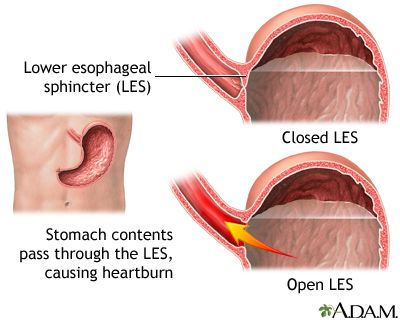Heartburn

What is heartburn?
Heartburn is a common condition that occurs when stomach acid backs up into the esophagus, causing a burning sensation in the chest or throat. It is often described as a feeling of discomfort or burning behind the breastbone, and can last for several hours.
Who's at risk for heartburn?
Heartburn can affect anyone, but certain groups of people are at higher risk, including:
- People who are overweight or obese
- People who smoke or use tobacco products
- Pregnant women
- People with a history of gastroesophageal reflux disease (GERD)
- People who consume spicy or acidic foods, or large meals before bedtime
- People who have a hiatal hernia or other medical conditions that affect the esophagus
What causes heartburn?
Heartburn is usually caused by a dysfunction of the lower esophageal sphincter (LES), which is a ring of muscle at the bottom of the esophagus that acts as a valve to prevent stomach acid from flowing back into the esophagus. When the LES doesn't function properly, stomach acid can flow back into the esophagus, causing irritation and inflammation.
How does heartburn start?
Heartburn typically starts after eating a meal or lying down, and may be accompanied by a range of symptoms, including:
- A burning sensation in the chest or throat
- Regurgitation of stomach acid into the mouth or throat
- Nausea or vomiting
- Difficulty swallowing or a sensation of food getting stuck in the throat
- Coughing or wheezing
- Hoarseness or sore throat
What are the symptoms of heartburn?
The most common symptoms of heartburn include:
- Burning sensation in the chest: This is the hallmark symptom of heartburn, experienced by nearly all individuals with the condition. It typically occurs after eating and may last from a few minutes to several hours.
- Sour or bitter taste in the mouth: Many people with heartburn (about 50-70%) experience a sour or bitter taste in the mouth due to stomach acid reaching the back of the throat.
- Regurgitation: Some individuals with heartburn (about 25-50%) may experience the sensation of stomach contents or acid coming back up into the throat or mouth.
- Difficulty swallowing: Around 10-15% of people with heartburn may experience difficulty swallowing, as the inflamed esophagus narrows, making it harder for food to pass through.
- Chronic cough or hoarseness: Approximately 10% of people with heartburn may develop a chronic cough or hoarseness due to irritation of the throat and vocal cords by stomach acid.
- These percentages are approximate and may vary among different populations. It is essential to note that heartburn symptoms can vary in severity and frequency from person to person.
How is heartburn diagnosed?
Diagnosing heartburn typically involves a comprehensive evaluation of a person's symptoms, medical history, and physical exam, as well as diagnostic tests such as endoscopy or pH monitoring to assess the extent of esophageal damage.
How can heartburn be treated?
Treatment for heartburn may involve a range of interventions, including:
- Medications, such as antacids, proton pump inhibitors (PPIs), or H2 receptor blockers, which may be used to neutralize or reduce stomach acid production
- Lifestyle changes, such as avoiding trigger foods or beverages, eating smaller, more frequent meals, avoiding lying down after meals, losing weight, or quitting smoking
- Surgery, such as fundoplication or LINX, which may be used to reinforce the LES and prevent stomach acid from flowing back into the esophagus
What complications may occur with heartburn?
If left untreated or poorly managed, heartburn can lead to a range of complications, including:
- Esophagitis, or inflammation of the esophagus, which may cause pain or difficulty swallowing
- Esophageal stricture, or narrowing of the esophagus, which may make it difficult to swallow food or liquids
- Barrett's esophagus, a precancerous condition that may increase the risk of esophageal cancer
How can I prevent heartburn?
Preventing heartburn involves making lifestyle changes and managing medical conditions that increase the risk of GERD, such as:
- Eating a balanced diet that is low in acidic or spicy foods, caffeine, and alcohol, and rich in fruits, vegetables, whole grains, and lean proteins
- Engaging in regular physical activity, such as brisk walking or jogging, for at least 30 minutes a day, most days of the week
- Maintaining a healthy weight and body mass index (BMI)
- Avoiding lying down or going to bed for at least 3 hours after eating a meal
- Quitting smoking or using tobacco products
- Managing stress through relaxation techniques, such as deep breathing, meditation, or yoga
Long-term management of heartburn
Managing heartburn over the long term involves ongoing monitoring of symptoms, regular healthcare provider visits, and following a treatment plan as prescribed by a healthcare provider. It may also involve making lifestyle changes to manage symptoms and prevent complications.
What is recent research saying about heartburn?
Recent research in heartburn has focused on improving prevention, diagnosis, and management of the condition, as well as identifying new treatment options and risk factors. Some of the promising areas of research include:
- Development of new medications or drug combinations, which may be more effective at reducing the risk of heartburn or improving outcomes after a heartburn attack than current treatments
- Investigation of the role of the gut microbiome in GERD, which may help identify new targets for treatment or prevention of the condition
- Exploration of the association between heartburn and other medical conditions, such as sleep apnea or anxiety, which may help improve overall health outcomes for people with GERD
Where can I go for more information on heartburn?
If you or someone you know has experienced heartburn or wants more information on how to prevent the condition, it is important to seek help from a healthcare provider who specializes in the treatment of gastroenterology or digestive disorders. The following organizations also provide information and resources on heartburn:

